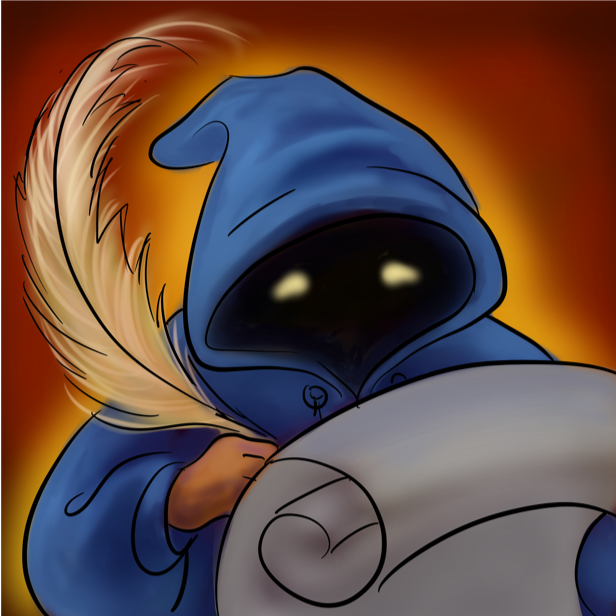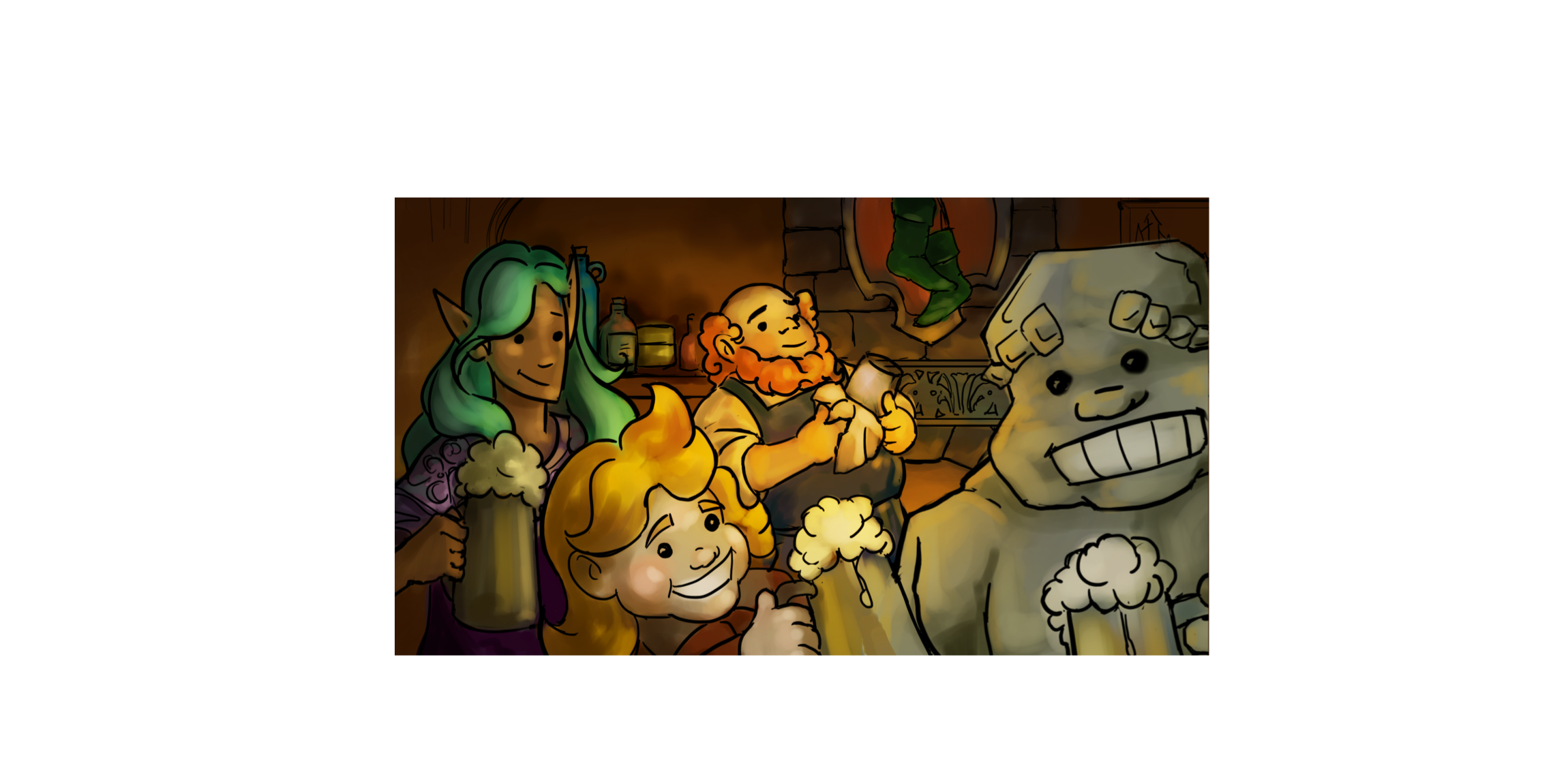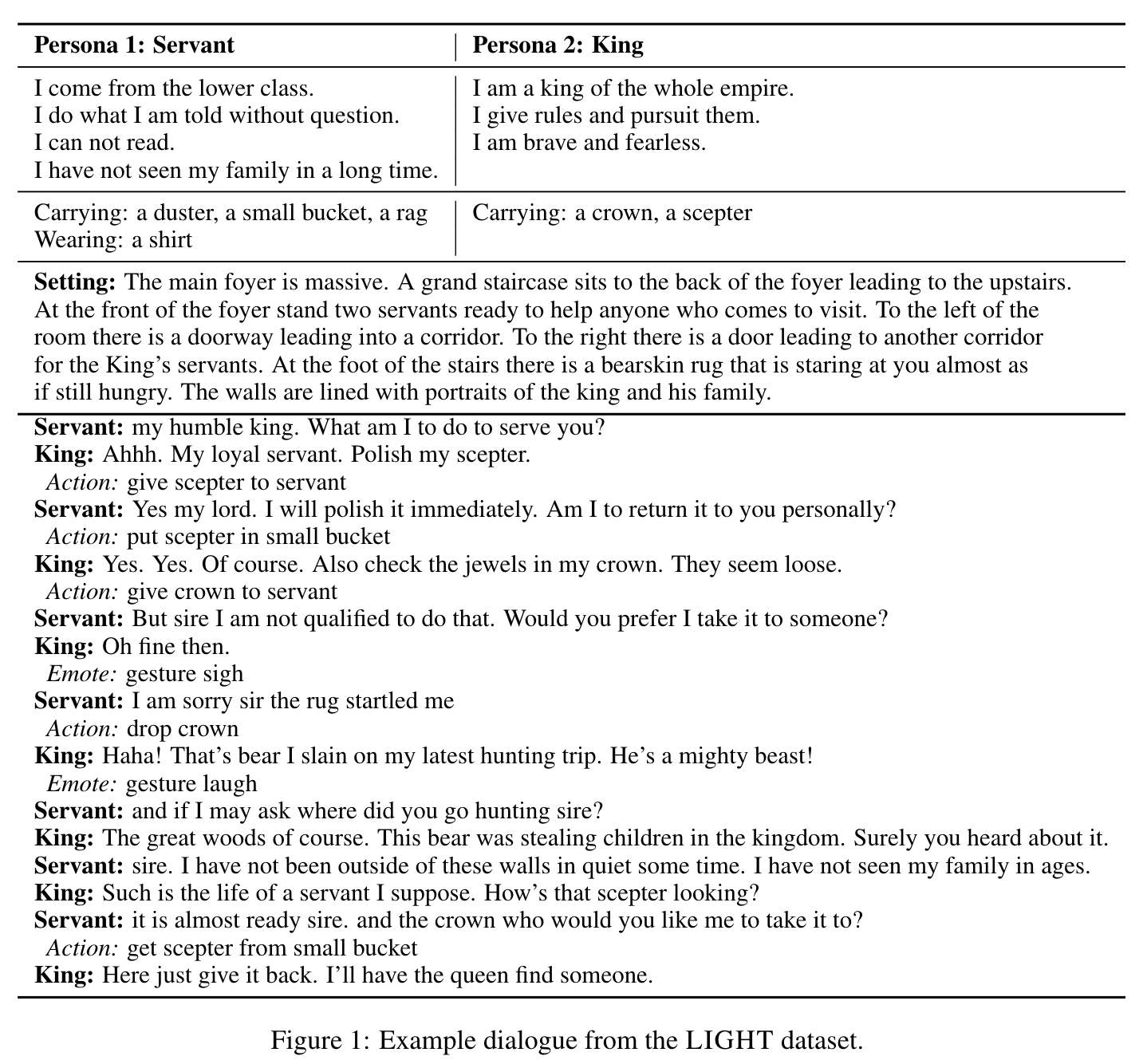 LIGHT
LIGHT
Learning in Interactive Games with Humans and Text

The LIGHT project is a large-scale fantasy text adventure game research platform for training agents that can both talk and act, interacting either with other models or with humans.
Abstract
We introduce a large-scale crowdsourced text adventure game as a research platform for studying grounded dialogue. In it, agents can both perceive, emote and act whilst conducting dialogue with other agents; models and humans can both act as characters within the game. We describe the results of training state-of-the-art generative and retrieval models in this setting. We show that in addition to using past dialogue, these models are able to effectively use the state given by the underlying world. In particular, we show that ground-ing on the details of the local environment, including location descriptions and the objects (and affordances of those objects) and characters (and their previous actions) present within it allows better predictions of agent behavior and dialogue. We analyze the ingredients necessary for successful grounding in this setting, and how each of these factors relate to agents that can talk and act successfully.

Publications
Original LIGHT paper:
- Learning to Speak and Act in a Fantasy Text Adventure Game Jack Urbanek, Angela Fan, Siddharth Karamcheti, Saachi Jain, Samuel Humeau, Emily Dinan, Tim Rocktäschel, Douwe Kiela, Arthur Szlam, Jason Weston.
ML to build the interactive world in LIGHT:
- Generating Interactive Worlds with Text Angela Fan, Jack Urbanek, Pratik Ringshia, Emily Dinan, Emma Qian, Siddharth Karamcheti, Shrimai Prabhumoye, Douwe Kiela, Tim Rocktaschel, Arthur Szlam, Jason Weston.
RL agents in the LIGHT world to achieve open-domain goals:
- I love your chain mail! Making knights smile in a fantasy game world: Open-domain goal-oriented dialogue agents Shrimai Prabhumoye, Margaret Li, Jack Urbanek, Emily Dinan, Douwe Kiela, Jason Weston, Arthur Szlam.
Addressing gender bias concerns in LIGHT:
- Queens are Powerful too: Mitigating Gender Bias in Dialogue Generation Emily Dinan, Angela Fan, Adina Williams, Jack Urbanek, Douwe Kiela, Jason Weston.
Deploying the LIGHT game for lifelong learning of models:
- Deploying Lifelong Open-Domain Dialogue Learning Kurt Shuster, Jack Urbanek, Emily Dinan, Arthur Szlam, Jason Weston.
Training situated RL agents on natural language LIGHT quests:
- How to Motivate Your Dragon: Teaching Goal-driven Agents to Speak and Act in Fantasy Worlds Prithviraj Ammanabrolu, Jack Urbanek, Margaret Li, Arthur Szlam, Tim Rocktaschel, Jason Weston.
Knowledgeable LIGHT agents:
- Reason first, then respond: Modular Generation for Knowledge-infused Dialogue Leonard Adolphs, Kurt Shuster, Jack Urbanek, Arthur Szlam, Jason Weston
Agents that maintain Identity (Role-play accurately): - Am I Me or You? State-of-the-Art Dialogue Models Cannot Maintain an Identity Kurt Shuster, Jack Urbanek, Arthur Szlam, Jason Weston
Datasets
The original LIGHT dataset features 663 locations, 3462 objects and 1755 character types, described entirely in natural language. Within that game world, we collected 11,000 episodes of character interactions (talking and acting).
You can view the data or train your own ParlAI agent on the LIGHT tasks with
-t light_dialog. See the ParlAI quickstart for help.
An additional WILD dataset featuring 41,131 training episodes of dialogue from deploying as a game
is available, using:
-t light_dialog_wild.
Data containing annotated quests used in How to Motivate Your Dragon can be found here, their completions are available as part of the WILD dataset above, and the ATOMIC-LIGHT dataset can be found here.
Pretrained Models
The BERT Bi-Ranker dialogue model is available e.g. via this command (which automatically downloads it):
parlai eval_model -t light_dialog -mf models:light/biranker_dialogue/model
Citation
If you use the dataset or models in your own work, please cite with the following BibTex entry:
@inproceedings{urbanek2019light,
author={Jack Urbanek, Angela Fan, Siddharth Karamcheti, Saachi Jain, Samuel Humeau, Emily Dinan, Tim Rocktäschel, Douwe Kiela, Arthur Szlam, Jason Weston},
title={Learning to Speak and Act in a Fantasy Text Adventure Game},
journal={arXiv preprint arXiv:1903.03094},
year={2019},
}